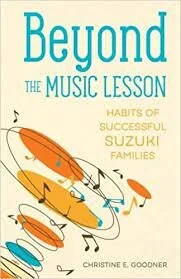Parent/ Guardian Corner
Parents (or guardians) play a strong role in the Suzuki philosophy and Triangle of Teacher + Student + Parent. In the Suzuki model, the parent is a “home practice partner.” Usually, the parent who attends lessons/group classes and takes notes for the student is the primary home practice partner.
This vital parental role separates the Suzuki Method from other methods. It is imperative that parents maintain an active role in the education of the student and, like students, be continuously and actively involved in the Suzuki community, so as to help facilitate home practice and bridge the time between lessons and group classes.
Parent Overview
Advice for Parents
As parents, your role is very vital in Suzuki instruction. Attending to the items below will help your Suzuki experience to be enjoyable, enriching, and worthwhile.
Read recommended books. Look for new books and articles as well - inform yourself.
Attend all lessons on time and unhurried. Consider how siblings may behave during lessons as they may be distracting during the lesson.
Record and/or take detailed notes at lessons.
Have the best quality [bluetooth] speaker and instrument that your budget will allow.
Do exactly as the teacher asks - please do not try to push ahead on your own. There are many resources available out there, but if you have questions, please ask the teacher FIRST.
Review and Refine, regularly - develop a plan for doing this or ask your teacher for help doing so. Review is where the student is developing skills. New material plants the seeds.
Turn the recordings on at home. Don’t expect your child to remember to listen on their own. This is your responsibility. LISTEN, LISTEN, LISTEN! To be fluent in playing, the child must be able to hear the piece in their head. One of the biggest factors in your child’s enjoyment and success will be the amount of listening you do. This must happen EACH day. It is immersion listening!
Try very hard not to argue with your child. Refer to the teacher’s comments in your notes or recording. Consider how important the point of contention is.
Attend Group Class and take notes. In groups, the child learns to follow a leader and listen to others while playing. Chances for sharing solos, playing games, and socializing at Group Class, keep the instrument from being something your child always does alone.
Recitals. Get involved in studio recitals and activities. These give your child the opportunity to gain confidence in public performance. Most children love to perform if they are well-prepared and performance is introduced in a safe manner.
Don’t compare your child’s progress with other children. Focus on how much they are learning and growing. Strive to be positive, accepting your child’s rate and style of learning, within the framework of what doing what the teacher asks. Balance your child’s progress with their emotional needs.
DON’T hurry, DON’T stop, DO enjoy the learning process.
Finding an Instrument
Please consult me prior any instrument/bow purchase or rental.
Finding a high-quality, correctly-sized, well set-up instrument and bow is absolutely vital to a student’s success. If the instrument is too large, damage or physical injury may result. The youngest students often begin with ‘box’ instruments or instruments made from homemade materials that help students learn how to handle the large instrument.
Instrument sizes come in 1/16, 1/10, 1/8, 1/4, 1/2, 3/4, 7/8. and full size (4/4).
Many Suzuki families pass on fractional-sized instruments, rather than purchase new ones. New instruments are not always necessarily better. These may be found in some of the studio families.
Consider the purchase or rental of an instrument and bow as an investment. If they are well maintained, they generally retain or even increase in value.
Required and Recommended Readings
Required Parental/Guardian/Adult Readings by Level
Before Lessons Begin & Pre-Twinkle
Nurtured by Love (revised edition), by Dr. Shinichi Suzuki
Beyond the Music Lesson, by Christine Goodner
Book 1
To Learn with Love, by William and Constance Starr
Book 2
Mindset, by Carol S. Dweck, Ph.D.
Book 3
Helping Parents Practice, by Edmund Sprunger
Book 4
The Talent Code, by Daniel Coyle
Book 5+
Ongoing (choose from the following list)
Shinichi Suzuki Books
Nurtured by Love, by Dr. Shinichi Suzuki ————— (consider re-reading!)
Ability Development from Age Zero, by Dr. Shinichi Suzuki
Suzuki-Based Books
Beyond the Music Lesson: Habits of Successful Suzuki Families, by Christine Goodner
This Will Help You Grow: Advice and Encouragement for Suzuki Parents, by Brittany Gardner
Winning Ways, A collection of the best American Suzuki Journal articles for parents from the past 20+ years. Sequel to First Class Tips for Suzuki Parents.
Helping Parents Practice, by Edmund Sprunger
To Learn with Love, by William and Constance Starr
Communication, Mindfulness, and Flow
Life Lens, by Michele Horner
Flow, by Mihaly Csikszentmihalyi
Grit, by Angela Duckworth
How to Get Your Child to Practice…Without Resorting to Violence, by Cynthia Richards
Learned Optimism, by Martin E. P. Seligman, Ph.D.
Nonviolent Communication, by Marshall B. Rosenberg, Ph.D.
Thinking, Fast and Slow, by Daniel Kahneman
The Talent Code, by Daniel Coyle
The Little Book of Talent, by Daniel Coyle
Cello & Musicianship
Casals and the Art of Interpretation, by David Blum
Intelligent Music Teaching, by Robert Duke
By Heart: The Art of Memorizing Music, by Paul Cienniwa
On Music, by Aaron Copland
Cello Technique, by Gerhard Mantel


